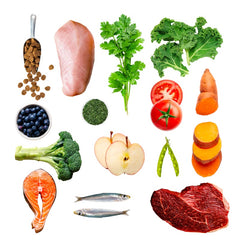Just like us, our four-legged family members can also suffer from allergies. Identifying the cause of the allergy is the first step followed by treatment and management of the allergy.
What is an allergy?
By definition, an allergy is an abnormal reaction of the body to a previously encountered substance through inhalation, ingestion, injection, or skin contact, often manifested by itchy eyes, runny nose, wheezing, skin rash, or diarrhea. The immune system recognises this substance as a threat and reacts by producing a type of antibody (protein) known as igE to defend against the allergen.
Types of Allergies in Dogs
- Skin
- Food
- Environmental
Skin Allergies

One of the most common skin allergies in dogs is caused by fleas. Known as flea allergy dermatitis, the dog's reaction is actually to the flea's saliva and the symptoms can last long after you have treated the dog for fleas. Often a dog will have inflamed, itchy and scabby skin.
What are the most common food allergies in dogs?
You may be surprised to read that the top 4 food allergens in dogs are proteins. Each time a pet eats food containing these substances, the antibodies react with the antigens, and symptoms occur.
1. Beef
Beef is one of the most common ingredients in a lot of pet foods, which may be the reason it’s the most common food allergen. When dogs are fed the same food day in and day out, their immune system can build up an intolerance to this protein.
2. Dairy
Yep, not surprisingly, many dogs have real difficulties digesting lactose, and as a result milk products can bring on stomach pains, flatulence, diarrhea, and even vomiting. This condition is known as lactose intolerance. Maybe reconsider sharing your puppy-chino or little morsel of cheese with your hound!
3. Eggs
Eggs contain a protein in the yolk that can present a reaction in dogs. You are best to read the ingredients of pet food and avoid these ingredients.
4. Grains
Grains such as wheat, corn, rice, sorghum, barley, and rye have traditionally

been used in dog food manufacturing as bulking ingredients. This also keeps the cost of food low. And like us, dogs didn’t evolve eating grains, which can cause difficulty digesting them. These carbohydrates are hard for dogs to digest and as well as having enough protein in their diet, it is just as important that the dog can absorb a quality carbohydrate.
What are the symptoms of food allergies in dogs?
Symptoms that your dog may present if they have a food allergy or intolerance include:
- Vomiting
- Diarrhea
- Itchy skin
- Dull skin and coat
- Ear infections
Environmental allergies
Hazards can include:
- Bee stings
- Grass & pollen (often seasonal)
- Certain plants
- Dust mites & moulds

While many of these triggers are difficult to control, you can minimise exposure by keeping lawns mowed, vacuuming regularly, and becoming familiar with these triggers. Understanding the cause of your dog’s allergies is a great way to manage environmental allergies.
How to treat dog allergies
While there is no cure for allergies, they can be managed to keep your dog comfortable and improve their quality of life. For severe allergic reactions, contact your vet and seek immediate treatment. Your vet will be able to treat the underlying response and any secondary infections.
Consider a course of immunotherapy with your vet to reprogram your dog’s immune system and reduce future allergic responses.
Eliminate or reduce anything that you may consider to be triggering the allergic response.
How to prevent allergies in your dog
- By feeding your dog a variety of food, you can avoid their immune system working towards a response to some proteins.
- Choose food with a single source of protein. This means that the food is made with the same protein each time and is not a mixture of different proteins such as turkey, chicken, and or lamb...
- Change the recipe of the food, they will thank you for the variety too!
- Avoid grains in dog food. Many dog foods are filled with grains to make them cheaper to manufacture. By avoiding these foods you will save money and ensure your dog remains healthy.
Ensure you maintain a healthy lifestyle with regular vet checks! Just like us, a balance of good nutritious food (like our grain-free Man's Best range), plenty of exercise & stimulation as well as just a few treats along the way.
©deliveryhound.com.au 2022






